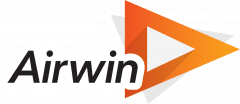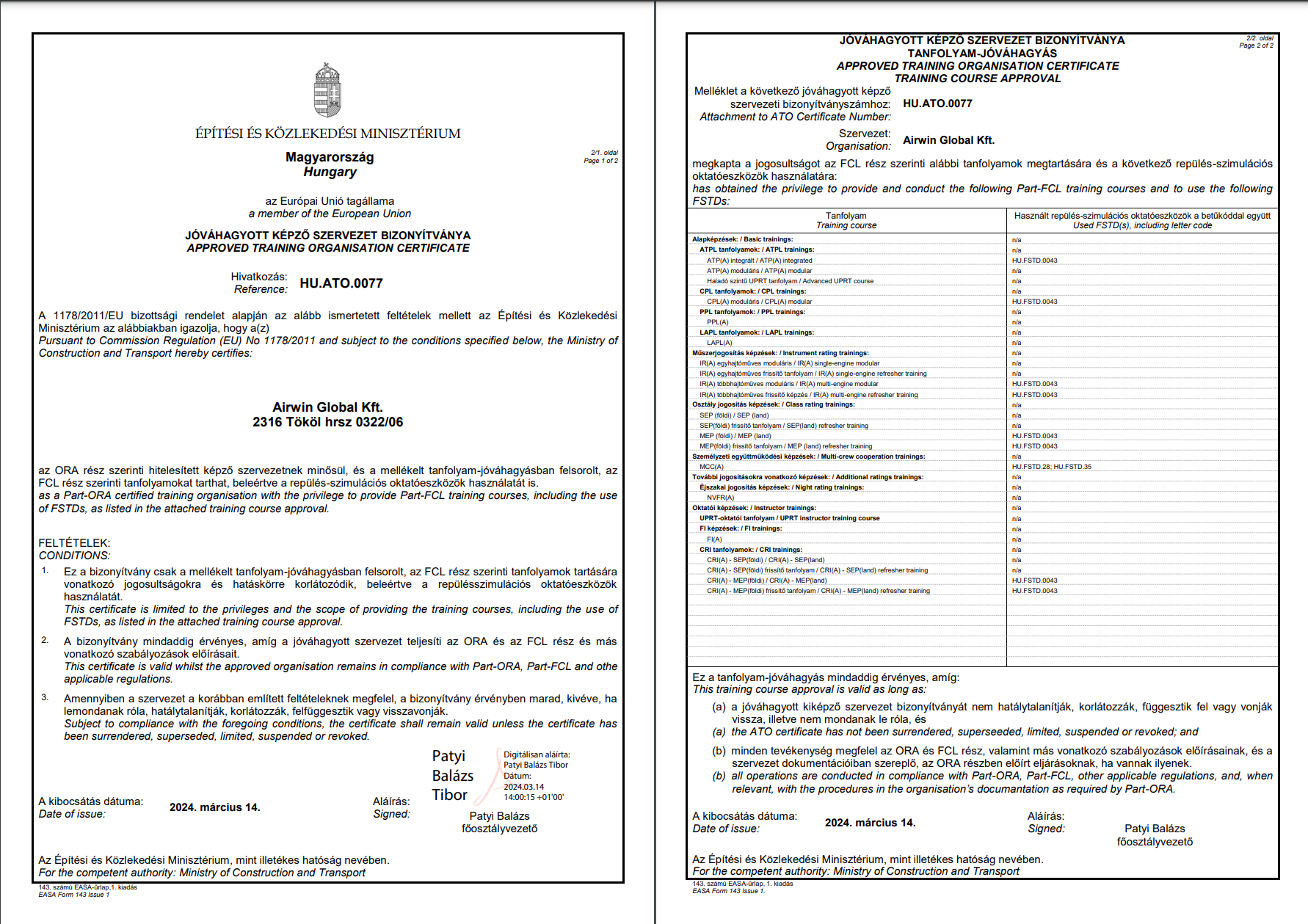ATPL MODULAR DISTANCE LEARNING THEORY
For the deeper understanding!
Expand your knowledge and explore endless possibilities!
Unlock the world of professional aviation and deepen your theoretical knowledge.
With the EASA ATPL(A) Theoretical Credit you can…
– skip fundamental theoretical subjects in any modular training program (e.g. IR(A), CPL(A))
– pursue professional qualifications (e.g. MCC, JOT)
– secure eligibility for type rating and more
VIRTUAL CLASSROOM
Theoretical instruction of the core subjects are available through the Airwin Virtual Classroom environment.
ALL-DIGITAL ADMINISTRATION
Airwin Training Management System (TMS) provides clean insight on student progress and schedule.
585
hours self-study
105
hours virtual classroom
33
weeks duration
Pre-Entry Requirements
– Minimum age 18.
– Hold valid EASA PPL(A)
– Part-MED Class 2 or 1 medical certificate
Crediting exisiting theoretical credits are not possible for this course. The followings cannot be credited:
– CPL(A) Theoretical Credit
– IR(A) Theoretical Credit
– ICAO ATPL(A) Theoretical Credit
Holders of an EASA Commercial Pilot License (Aeroplane) will be credited with 225 self-study hours and 25 hours of classroom instruction which will be deducted from the course.
Valid EASA IR(A) rating holders might be credited with the followings with respect to their pilot license:
– PPL(A) + IR(A) 135 hours self-study, 15 hours classroom
– CPL(A) + IR(A) 360 hours self-study, 40 hours classroom
This training program is approved in accordance with EASA AMC and GM documentation.

Contracted partners:

Course Structure
Students will be introduced to the core subjects creating the foundation of further topics during the course such as the composition of the international standard atmosphere or the regulatory background required to be aware of as a professional pilot. Understanding the teaching and learning process with the key fundamentals of the distance learning training program serves as a key tool to facilitate progression during the whole training program.
Section I. | Introduction to Commercial Air Transportation | Header | Header | Header | Header | |
|---|---|---|---|---|---|---|
EASA CODE | Subject Title | Progress test | Supervisied Self-study | Classroom lectures | Instructor Acces | Training weeks |
10 | Air Law | 4 | 35 | 5 | 3 | 2 |
70 | Operational Procedure | 6 | 45 | 5 | 5 | 3 |
40 | Human Performance and Limitation | 4 | 35 | 5 | 3 | 2 |
50 | Meteorology | 6 | 55 | 5 | 5 | 3 |
AREA 100 | Formative Assessment LO 02 01 00 / 02 02 00 | 1 | - | 2 | - | - |
Cell | Cell | 21 | 170 | 22 | 16 | 10 |
All of the technical aspects of aviation are going to be introduced during this section. Understanding the technological background used for the design and manufacture of aircrafts used in the everyday commercial environment is the fundamental tool to serve a proper understanding of the latter introduced ‘Flight Performance and Planning’ methods. Students will be introduced to the certification criteria and common industry standard practices during the manufacture and maintenance of the equipment used for everyday operaion.
Section II. | Aircraft General Knowledge | Header | Header | Header | Header | |
|---|---|---|---|---|---|---|
EASA CODE | Subject Title | Progress test | Supervisied Self-study | Classroom lectures | Instructor Acces | Training weeks |
21 | Aircraft General Knowledge – Airframe, systems | 4 | 35 | 2 | 3 | 2 |
21 | Aircraft General Knowledge – Powerplant | 4 | 35 | 2 | 3 | 2 |
21 | Aircraft General Knowledge – Electrics and electronics | 3 | 25 | 1 | 1 | 1 |
225 | Aircraft General Knowledge – Instrumentation | 4 | 35 | 5 | 3 | 2 |
AREA 100 | First Summative Assessment | 1 | - | 2 | - | - |
16 | 170 | 12 | 10 | 7 |
This section is intended to introduce the key aspects of general navigation and the fundamental methods used during radio navigation while pilots are using electrical communication equipment on-board to facilitate navigation with both internal and external aids.
Section III. | Navigation and Radio Transmission | Header | Header | Header | Header | |
|---|---|---|---|---|---|---|
EASA CODE | Subject Title | Progress test | Supervisied Self-study | Classroom lectures | Instructor Acces | Training weeks |
61 | Navigation – General Navigation | 6 | 55 | 5 | 9 | 3 |
62 | Navigation – Radio Navigation | 4 | 35 | 5 | 3 | 2 |
90 | Communications | 4 | 35 | 5 | 3 | 2 |
AREA 100 | Mental Math | 1 | - | 2 | - | - |
Cell | 15 | 125 | 17 | 15 | 7 |
This section is intended to summarize all previously covered subjects and put the recently acquired knowledge into actual practice. The aim is to enable students to conduct industry-standard, proper pre-flight preparation with mid-flight administration and post-flight briefing. The practical utilization of the common techniques is forming an inevitable part of the training to facilitate safe and efficient operation of entrusted professional equipment such as the aircraft itself.
Section IV. | Principles of Flight Operation | Header | Header | Header | Header | |
|---|---|---|---|---|---|---|
EASA CODE | Subject Title | Progress test | Supervisied Self-study | Classroom lectures | Instructor Acces | Training weeks |
81 | Principles of Flight – Aeroplanes | 6 | 55 | 5 | 9 | 3 |
31 | FPM – Mass and Balance | 4 | 35 | 5 | 3 | 2 |
32 | FPM – Performance | 4 | 35 | 5 | 3 | 2 |
33 | FPM – Flight Planning and Monitoring | 4 | 35 | 5 | 3 | 2 |
AREA 100 | Second Summatiev Assessment | 1 | - | 2 | - | - |
Cell | 19 | 160 | 22 | 18 | 9 |
Upon completion of each section, the Training Department issues an official recommendation dedicated to the licensing or examining authority. The recommendation includes the results of the home examinations passed for each subject.
A few things we’re great at
For the Flight Instructor training program, we packed together everything you need to gain experience from the beginning…
Virtual Classroom Instruction
Study from your office or home and consult with Airwin Instructors online.
All Electronic Administration
We save the planet for the future generation of pilots. Airwin trainings are paperless!
eCQB 2020 and Area 100 KSA
Our course is approved and compatible with the latest learning objectives and revisions of the ATPL(A) theoretical syllabus.
Our pricing plan
standard
1,650 €
Supervised Self-Study
12 months access to AE Question Bank
65 hours virtual classroom lectures
professional
2,350 €
Supervised self-study
12 months access to AE Question Bank
65 hours virtual classroom
eBooks for all ATPL(A) Theory subjects
Ready?
book a session now


